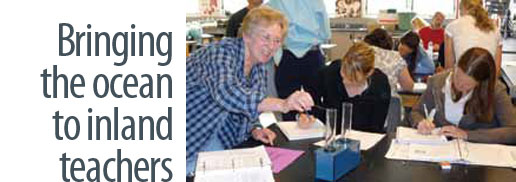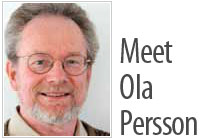
Ola Persson is a CIRES researcher at NOAA’s Earth System Research Laboratory studying Arctic meteorology. Ola’s research helped to fund the COSEE teacher workshops on Oceans and Climate through an NSF grant.
What motivates you to participate in education and outreach?
It helps me. If I can’t explain something in reasonably simple terms, perhaps I don’t understand the gist of it myself. That’s one motivation and that’s a view I’ve had for a long time. But the other thing is it’s a requirement on proposals and grants. Sometimes one thinks it’s kind of a pain, but when you actually get something done, you recognize the value of it. Why did you come to CIRES Education and Outreach when you were writing your NSF proposal? Well, because I don’t want to have to think about how to organize an outreach project, and you do that well. So it makes it much easier.
What do you think science education for kids should look like?
They shouldn’t be memorizing a lot of facts, but obviously you have to know some facts to understand how things work. You have to know the basics of chemistry, for instance, but I think what’s important is the relationships between different processes and how everything is linked. Even scientists don’t always understand that. Results are only meaningful if you understand how they fit into everything else.
What did you personally get out of that workshop that you supported?
I’m an atmospheric scientist with my own narrow focus. I had to broaden the view a little bit for that presentation, and it was useful. I’ve used that presentation since, and have been asked to give another one as well. It’s also useful for discussions between myself and oceanographers. When we discuss the different impacts on sea ice, people are hopefully able to pull back a little from their own discipline.
Do you think it’s important for scientists to be engaged in outreach?
Ultimately, of course, the money paying for the research comes through public funds. You are being responsible to the people actually paying you. And on the other side, I think it’s extremely important for people to be educated and to understand the issues when they come up in some political debate. People come in with some very naïve or uninformed opinions, and I think that’s a big detriment to the entire society.![]()
CIRES is funded to partner with the COSEE-West site in southern California. Through that partnership, teachers can learn from experts in each location. In the spring of 2009, Dr. Ola Persson, Dr. Chris Fairall, and Dr. Jeff Hare from NOAA’s Earth System Research Laboratory (ESRL) in Boulder, Colorado, gave presentations to teachers. During the summer institute, teachers toured ESRL’s laboratories, helped launch a weather balloon, and visited the Science On a Sphere® exhibit.
This year’s themes include Arctic sea ice, the Greenland and Antarctic ice sheets, sea level, global climate processes, and effects on Colorado’s weather, ecosystems, and economy. Stories about the Arctic Inuit, impacts on alpine pika populations, and the effects of pine bark beetles will make these issues tangible. Teachers from Colorado will also travel to Los Angeles to participate in workshops through COSEE-West. ![]()
Applications are being accepted for 2010. Click here for workshop dates and details, including past presentations
Here in Colorado, waves crashing in the surf sound like a distant vacation fantasy. But although the Earth’s oceans are out of sight, they need not be out of mind for Colorado educators. After all, much of the West used to be part of an ancient ocean millions of years ago.
CIRES Outreach brings the ocean back to Colorado by connecting oceanic, atmospheric, and climate science researchers with teachers throughout the state. The program focuses on a new ocean and climate sciences topic each year, presenting lectures by scientists who share their cutting-edge research and links to classroom/lab activities and field trips.
Videoconferences make the program accessible to distant parts of the state. “Living in Steamboat makes it difficult to take workshops,” said one teacher, a participant in the 2009 Center for Ocean Sciences Education Excellence (COSEE) collaborative summer institute. “The COSEE videoconference made it easy. I felt like I was there.”



